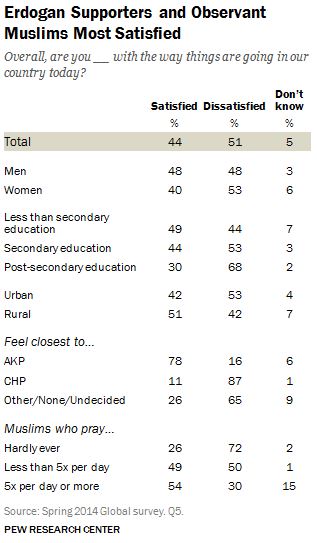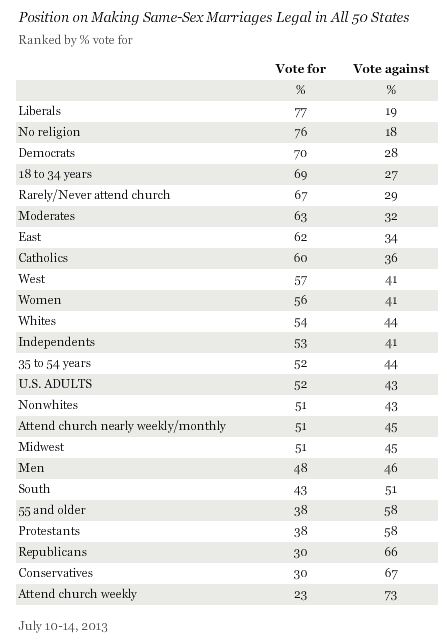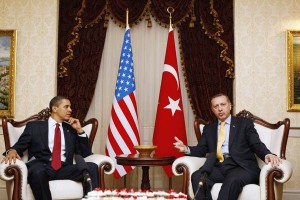
The Pew Research Center has conducted a poll in Turkey to assess the public mood as Islamist prime minister Recep Tayyip Erdogan runs for president. For some context on the matter:
Erdogan and his party, the moderately Islamist Justice and Development Party (AKP), have dominated Turkish politics for the last decade, overseeing considerable economic growth and an expanding role for Turkey in regional and world affairs. And most observers expect Erdogan to win the August 10 election.
Someone needs to tell Pew that the term “moderately Islamist” is an oxymoron, if there ever was one. Moderate and radical Islamists have left no doubt that they pursue the same goals, even if their methods are different. And that includes Erdogan himself. The “Islamist” in Erdogan is the Erdogan EVERYONE knows; regardless of any disagreements, majorities of Turks from across the board believe he is taking the country toward deeper Islamization.
On this particular question, both secular and religious Muslims agree that Islam plays a large role in Turkish political life.
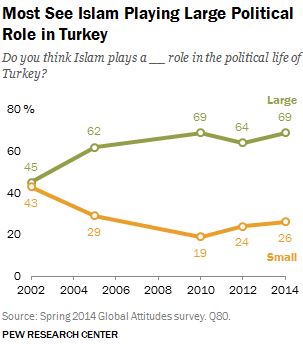 But here is where it gets interesting: get who is those happiest under Erdogan, aside from members of his own party.
But here is where it gets interesting: get who is those happiest under Erdogan, aside from members of his own party.
Some of the biggest divides are based on political party association and frequency of prayer among Muslims. For instance, 78% of Turks who say they feel closest to Erdogan’s moderately Islamist AKP are satisfied with the way things are going in Turkey, while only 11% among supporters of the opposition Republican People’s Party (CHP) feel the same.
Similarly, 54% of Turkish Muslims who pray five times per day or more are satisfied with current national conditions, while only 26% of those that hardly ever pray agree.
The secular/religious divide is the same when it comes to street protests against the government:
Support for the protests is higher among more educated Turks, those associated with opposition parties and more secular Muslims than it is for less educated Turks, AKP supporters and more devout Muslims.
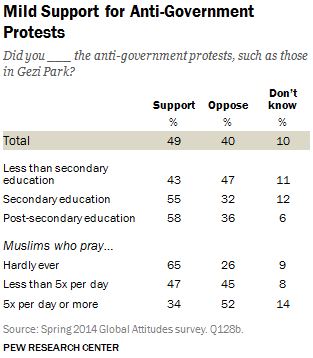 These numbers reminded me of a poll in the US from a year ago on support of equality for gay people.
These numbers reminded me of a poll in the US from a year ago on support of equality for gay people.
A frequent accusation against New Atheists has been that we don’t have “nuance“; that we fail to see the distinction moderate religion and radical religion; that we paint all religion with the same broad brush. As most accusations against New Atheists, this is a baseless claim. It is a straw man attack. While there is diversity in the religious landscape, for most practical purposes, it simply boils down to some of the faithful being more devout, and some less so-something no New Atheist has ever denied.
The claim about “diversity” would have merit if you couldn’t find a link between the frequency of worship and stances of the faithful on sociopolitical matters. Suppose, for example, that there were large numbers of weekly church goers who supported equality for gays; the reality is that while more and more churches are coming to accept gays, those happen to be the churches emptying the fastest. When conservative Christians put on massive anti-gay rallies, the counter-protesters tend not to be cross-waving Episcopalians; in fact, whatever faith they may practice as individuals, collectively, they tend not to be speaking in the name of any faith at all. Likewise, it is conceivable that there would be large numbers of devout Muslims supporting protests against Islamist Erdogan; but that is simply not the case. In the end, decreasing the negative effects of religion appears to be possible only by less religion, and that is about as “nuanced” as it gets.

